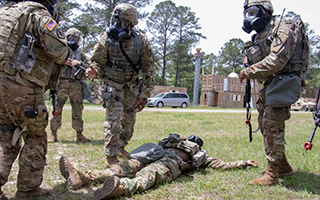
U.S. Army National Guard (Photo courtesy of Spc. Tori Miller)
Background
Exposure of U.S. military personnel to toxic substances in the course of their duties is an issue of longtime concern for service members, their families, and the nation. The NSTC/JEEP Toxic Exposure Research Working Group (TERWG) seeks to improve understanding of the potential health effects from contact with herbicides, burn pits, radiation, chemical weapons, and other military occupational hazards. TERWG identifies collaborative research opportunities and resources and is responsible for developing a five-year strategic research plan on health outcomes.
Legislative Mandate
In August 2022, Congress passed the Honoring our Promise to Address Comprehensive Toxics (PACT) Act (Public Law 117-168) or the PACT Act. This comprehensive legislation expanded health care access and benefits for Veterans exposed to toxic substances during their military service. PACT also directed the Secretary of the Department of Veterans Affairs (VA), in collaboration Federal partners, to establish a Toxic Exposure Research Working Group (TERWG) and defined its collaborative research mission and goals.
The TERWG is co-chaired by VA, the Department of Defense, the Agency for Toxic Substances and Disease Registry, and the White House Office of Science and Technology Policy. The group has a dynamic structure, but generally consists of thirty-eight representatives and subject matter experts from eight Federal departments and several agencies.
Activities
In accordance with the PACT Act, the TERWG has developed a strategic plan to coordinate federal research to address data gaps on exposure-related veteran illnesses.
Contact
- Joint Subcommittee on Environment, Innovation, and Public Health
- [email protected]


